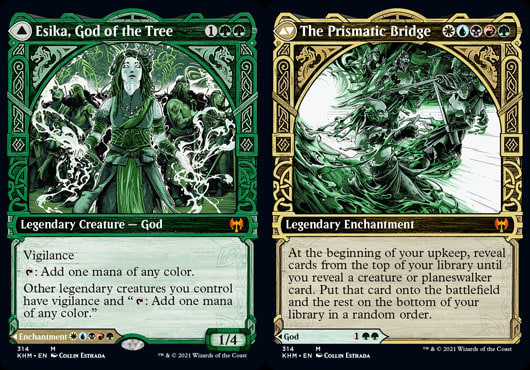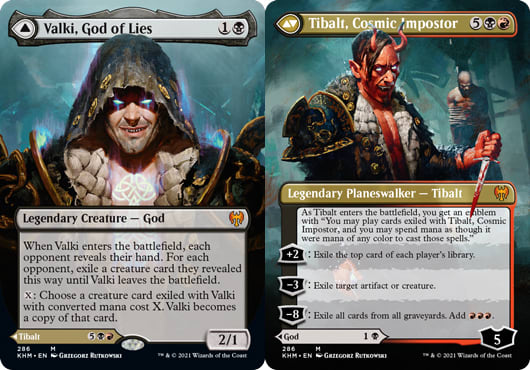While the Kaldheim previews keep trickling out, we'll keep talking about them!
Today I want to talk about three of the new cards that have caught my eye the most. If you've followed me for any amount of time, all of these cards should make perfect sense to you. They have big, splashy effects across numerous colors.
I'm not going to waste too much time on introductions here, as I'd rather just dive right in!
One of the things that occurred to me while evaluating these MDFCs, and I think I mentioned it in a previous article, is how much better they make legendary permanents. The simple fact that you can play this as an Esika, God of the Tree, and all of a sudden, every subsequent copy isn't just dead in your hand is awesome. Tiny improvements like this to longstanding game issues are always such a joy to experience.
As for the card itself, I like it a lot. While paying three mana for a 1/4 mana dork isn't the best rate, this does improve your other legendary creatures, especially if you already have them on board as of playing this. I think the backside of the card is where it really shines, and that's the real payoff. As a five-mana enchantment, this has a really strong effect. This is basically allowing you to cascade every turn, only without any specific converted mana cost restriction, and you can only hit creatures and planeswalkers. Considering you can fill your deck with expensive things, this could be quite profitable, but you can also hit some of the 1- and 2-drops you're likely running to enable the back side of this card.
One thing I look for in terms of the MDFCs is that both sides really stand on their own. I do think the Esika side is a little under-powered, but I think The Prismatic Bridge, putting a permanent on the battlefield every turn - which could be anything from am Emrakul to a six-mana planeswalker - does kind of insist upon that.
There are also a lot of cute interactions with the MDFCs that actually increase their power-level quite a bit. The following is the one I'm most excited about...
As you cascade, you check the front face's mana cost to see when you hit a qualifying cmc. Once you do, you can cast either face of that card (so no land faces). #WotCstaff
— Matt Tabak (@WotC_Matt) January 7, 2021
Yes, this means if you cast Bloodbraid Elf and cascade into an Esika, God of the Tree, you can cast The Prismatic Bridge instead. This is kind of amazing, and makes me really look forward to trying some of the new MDFCs in my Cube.
It's likely no coincidence that both Valki and Loki have three of the same letters in their names. This is easily the best Tibalt card we have ever seen, and I don't think we can even make fun of him anymore.
As I mentioned when talking about Esika, both sides of Tibalt are great and they're able to stand on their own. I would easily play Valki, God of Lies as a 2/1 for two mana, and I think the ability to basically Kitesail Freebooter a creature and turn into that creature is pretty sweet. Nabbing a Questing Beast and then turning into a Questing Beast sounds good to me.
The back half of the card is where he really shines though. Again, all of the same things apply to Valki and Tibalt as they do to the previous card. Being able to not have extra dead Tibalts in your hand in the late game is so good. This is why MDFCs are another "scales well" mechanic, just like kicker and flashback.
As a planeswalker, this card has a lot to unpack. Getting an immediate emblem from a planeswalkers is always awesome, just like starting at five loyalty, and this one lets you play any card exiled with Tibalt. Because it uses the term "play" instead of "cast," this means you can play lands that get exiled as well. While the first ability puts you to a massive seven loyalty, it also exiles the top card of each player's library, which is a big deal. One thing you want to consider is that, with Tibalt's emblem being permanent and irremovable, his +2 basically reads "Draw 2 cards that can't be discarded and don't count toward your maximum hand size." The reason being is that you can always play these cards, even if Tibalt leaves the battlefield, and you're seeing two new cards a turn. That's a big deal.
His -3 is also awesome, and again, continues to exile cards for you to play. This time you're able to target any artifact or creature, and then cast it for yourself. One cool thing you can do is exile your own creatures if necessary, maybe before you wipe the board, or if you want to trigger their enter-the-battlefield ability again.
The -8 ability is pretty weird, exiling all cards from all graveyards and adding ![]()
![]()
![]()
![]() , but then again, you can now play all of the cards that have been exiled, so it's basically like putting all of the cards in all graveyards into your hand. When you start to look at it like that, Tibalt seems pretty crazy, and the Sultai deck that plays Shardless Agent to hit Valki and cast Tibalt is basically everything I want in any format.
, but then again, you can now play all of the cards that have been exiled, so it's basically like putting all of the cards in all graveyards into your hand. When you start to look at it like that, Tibalt seems pretty crazy, and the Sultai deck that plays Shardless Agent to hit Valki and cast Tibalt is basically everything I want in any format.
As a huge comic fan, and a huge fan of cosmic Marvel characters, I'm loving all these cards with Cosmos and Cosmic in their flavor.
Everyone knows that Sultai is my jam, so whenever there's a huge, playable threat in any of those color combinations, I get a little excited. Koma, like Tibalt, has a lot to unpack. It reminds me a lot of Tendershoot Dryad, only, you know, a lot bigger.
This is obviously comparable to a ton of late-game Blue finishers, such as Aetherling, Lochmere Serpent, Nezahal, Primal Tide, and Pearl Lake Ancient. It comes from a long line of creatures that can't be countered, cost more than 6 mana, and say "you probably should have won the game before this resolved."
Like the aforementioned Tendershoot Dryad, Koma makes a creature every upkeep, not just your own. Unlike Tendershoot Dryad, the creatures are naturally 3/3s without the City's Blessings, and Koma is a massive 6/6, rather than a 3/3.
Like those other Blue finishers that came before it, Koma can't be countered, it provides you with a steady stream of bodies every single turn, it can tap any permanent, preventing them from using their activated abilities, and it can effectively protect itself.
This card is brutal, and much like a Consecrated Sphinx, if you can't kill it by the very next upkeep after it resolves, you're likely too far behind. This is a ![]()
![]() finisher that doesn't need a single other creature on the board to simply dominate a game, and that's extremely impressive. While I'm not sure if any others will exist in Standard, if you happen to have a serpent already on the board, you can begin to protect Koma immediately. Otherwise, the opponent gets a very small window for dealing with this.
finisher that doesn't need a single other creature on the board to simply dominate a game, and that's extremely impressive. While I'm not sure if any others will exist in Standard, if you happen to have a serpent already on the board, you can begin to protect Koma immediately. Otherwise, the opponent gets a very small window for dealing with this.
Keep in mind the form of protection here is indestructible and not hexproof, so you're good against things like damage and removal, Koma can still be bounced or exiled with other effects.
As you can imagine, it's very likely all three of these cards are going into my Cube.
Guys, this set is shaping up to be pretty sweet, and I'm really excited about a lot of the mechanics and previewed cards so far. Let me know what you think of the three that I talked about today, and let me know if there are any others that are really standing out to you.
As usual, thanks so much for reading. We're living in crazy times so please, please stay safe. I love you all, and I'll catch you again next week!
Frank Lepore
Twitch | YouTube | Patreon | Freshly Brewed

























